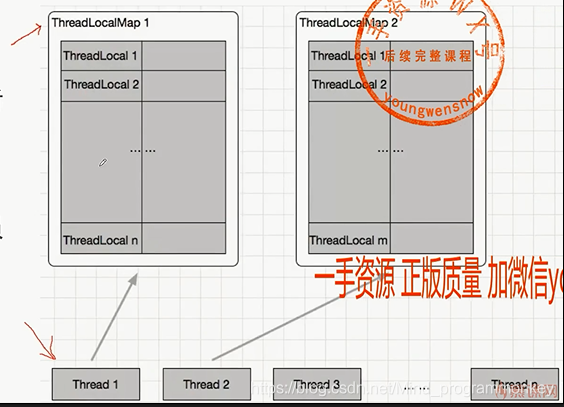外包一面:ThreadLocal的使用场景及使用方式
点击上方蓝色字体,选择“标星公众号”
优质文章,第一时间送达
两大使用场景-ThreadLocal的用途
典型场景1:每个线程需要一个独享的对象
package threadlocal;
import java.text.SimpleDateFormat;
import java.util.Date;
import java.util.concurrent.ExecutorService;
import java.util.concurrent.Executors;
/**
* 描述: 利用ThreadLocal,给每个线程分配自己的dateFormat对象,保证了线程安全,高效利用内存
*/
public class ThreadLocalNormalUsage05 {
public static ExecutorService threadPool = Executors.newFixedThreadPool(10);
public static void main(String[] args) throws InterruptedException {
for (int i = 0; i < 1000; i++) {
int finalI = i;
threadPool.submit(new Runnable() {
@Override
public void run() {
String date = new ThreadLocalNormalUsage05().date(finalI);
System.out.println(date);
}
});
}
threadPool.shutdown();
}
public String date(int seconds) {
//参数的单位是毫秒,从1970.1.1 00:00:00 GMT计时
Date date = new Date(1000 * seconds);
// SimpleDateFormat dateFormat = new SimpleDateFormat("yyyy-MM-dd HH:mm:ss");
SimpleDateFormat dateFormat = ThreadSafeFormatter.dateFormatThreadLocal2.get();
return dateFormat.format(date);
}
}
class ThreadSafeFormatter {
public static ThreadLocal<SimpleDateFormat> dateFormatThreadLocal = new ThreadLocal<SimpleDateFormat>() {
@Override
protected SimpleDateFormat initialValue() {
return new SimpleDateFormat("yyyy-MM-dd HH:mm:ss");
}
};
public static ThreadLocal<SimpleDateFormat> dateFormatThreadLocal2 = ThreadLocal
.withInitial(() -> new SimpleDateFormat("yyyy-MM-dd HH:mm:ss"));
}
典型场景2:当前用户信息需要被线程内所有方法共享
package threadlocal;
/**
* 描述: 演示ThreadLocal用法2:避免传递参数的麻烦
*/
public class ThreadLocalNormalUsage06 {
public static void main(String[] args) {
new Service1().process("");
}
}
class Service1 {
public void process(String name) {
User user = new User("超哥");
UserContextHolder.holder.set(user);
new Service2().process();
}
}
class Service2 {
public void process() {
User user = UserContextHolder.holder.get();
ThreadSafeFormatter.dateFormatThreadLocal.get();
System.out.println("Service2拿到用户名:" + user.name);
new Service3().process();
}
}
class Service3 {
public void process() {
User user = UserContextHolder.holder.get();
System.out.println("Service3拿到用户名:" + user.name);
UserContextHolder.holder.remove();
}
}
class UserContextHolder {
public static ThreadLocal<User> holder = new ThreadLocal<>();
}
class User {
String name;
public User(String name) {
this.name = name;
}
}
ThreadLocal方法使用总结
ThreadLocal原理
ThreadLocal使用问题内存泄露
实际应用场景-在spring中的实例分析
作者 | HelloWorld搬运工
来源 | csdn.net/wufaliang003/article/details/118887557

评论

